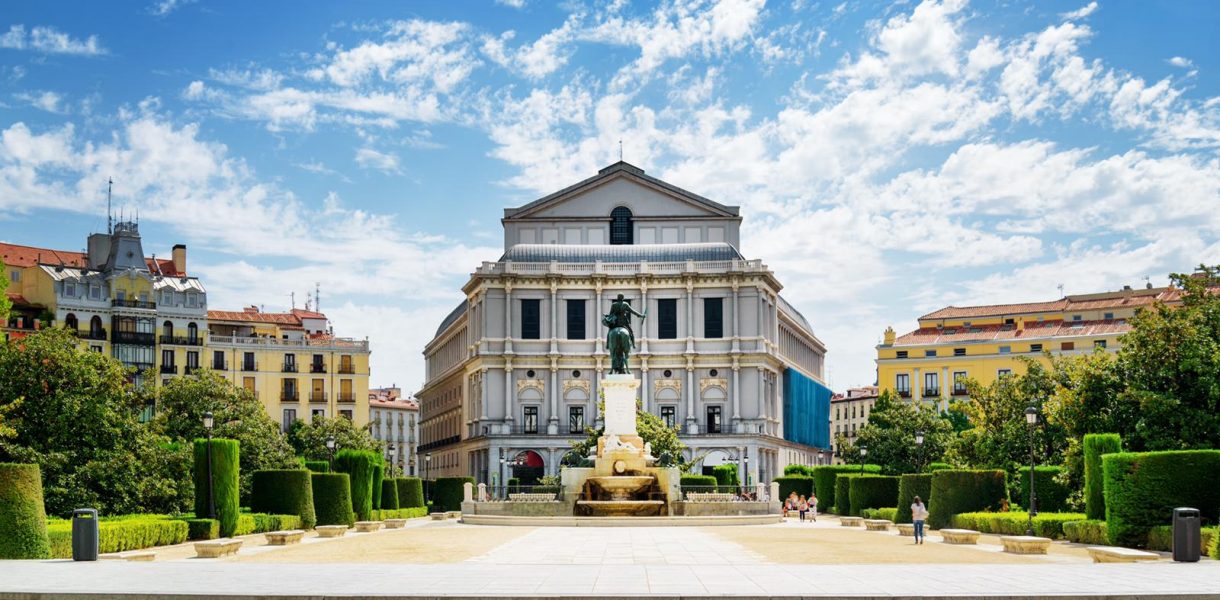All of a sudden, the simple things like singing with each other, or singing a song that is about love and communication when you can’t have it, becomes then very essential; it becomes real
Julia Burbach
The latest period of lockdown cast the future of the live music industry into doubt once again. But with the New Year in sight and the fresh promise of a vaccine for the UK announced just days ago, a return to some kind of normality finally seems within reach. While many of the world’s major venues remain closed, some of Europe’s biggest opera houses offer a bright future for the eager concertgoers among us.
Located in one of the cities hit hardest by the virus, the Teatro Real in Madrid is making titanic efforts to keep its doors open to the public. Through investing in safety measures expecting to cost up to one million euros by the end of the year, they have been staging performances for reduced audiences since as early as July. Someone who has experienced these efforts first-hand is Opera Director Julia Burbach, who is currently reviving Claus Guth’s insightful production of Don Giovanni at the Teatro Real for performance in mid-December and January 2021.
Delightfully warm, candid and down-to-earth, Julia is an inspiration to all aspiring artists. Having been nominated for Best Newcomer at the 2019 International Opera Awards, she has worked internationally as a director, revival director, movement director and assistant director in opera, theatre and film, including numerous original works and revivals for the Royal Opera House, where she was formerly a Staff Director.
In conversation with Apocalypse Music co-founder Pia Rose Scattergood, Julia discusses mask-wearing in Madrid, the fringe venues to which she owes much of her early success, and how the opera landscape is set to change indefinitely as a result of the pandemic.

If 2020 has taught us anything, it’s to expect the unexpected, and the world of opera is no exception as Julia tells me over Zoom.
“Madrid is a very unexpected gig which fell into my lap. When I was back in London every day my Mum and all my friends were on the phone to me saying “are you really going?” And I thought, well they haven’t cancelled it yet, so I guess I am going! It’s strange because you live every day much more day by day, or maybe week by week, because of course endless amounts of things have changed this year, right? And still are, and I suppose will be for the foreseeable future beyond the virus.”
Julia has built a freelance career while travelling the world, something that the pandemic has completely prohibited at various points throughout the year. Relocating to a new city in 2020 demands the fresh challenge of adjusting to new Covid safety regulations, and in Madrid, the protocol both on and offstage is equally firm. According to Julia, it is the strict attitude to mask-wearing, coupled with the Teatro Real’s exceptional ability to regularly test the cast and crew once a week, that has allowed her and her team to stage Claus Guth’s production as intended.
“The very first thing I noticed when arriving here is that absolutely everybody here without fail wears a mask on the street. It’s the law! We wear the mask in rehearsal, the singers sing with a mask. The singers will of course remove them in performance, and for the very last stage in orchestra rehearsals. But prior to that, absolutely without fail all the time, we are all wearing the masks. We went out for dinner once, as a cast. We couldn’t cope, because for the first time after three weeks of working with these people absolutely every day, I saw their faces. I mean, it was mental! So it’s the regular testing and the mask wearing, and the disinfecting the hands, and between those measures, we are otherwise rehearsing absolutely normally. There is no distancing. I am directing the show that is the original version of this show. And that, of course, is amazing – that this is happening here.”
The pandemic dramatically exposed the structural fragility of the arts ecosystem and its implications for live music have been situational and wholly contingent upon each venue’s ability to mass test, and more broadly, access to specific types of funding. While it goes without saying that money is essential for the long-term survival of the industry in its entirety, innovation from producers and venues have inspired both small- and large-scale operatic institutions to re-evaluate efficiency in budgetary and logistical terms, in turn encouraging creatives to think outside the box when reinterpreting the art form.
Julia is particularly enthusiastic about the recent work of the Arcola Theatre in Dalston, a venue renowned for producing daring, high-quality theatre in the heart of East London. The Arcola had the ingenious idea to build a new outdoor performance space, equipped with a fully stocked open-air bar, which they hope will become a new creative hub for upcoming artists to flourish. Designed by multi-award-winning international stage designer Jon Bausor and built by a team of freelance theatre and live events technicians, the Arcola Outside project offers a practical solution to reducing Covid risks in performance arenas while giving much-needed support to artists, audiences, and to arts workers, 70% of whom are freelancers.
“The Arcola is a small, established, very successful fringe venue, and has grown from very humble beginnings to something that is very well known and respected. They were also the theatre many many years ago to give me a chance in London, and this is true for many other people. The Arcola is very important in fostering talent at the beginning of careers, and bringing art to community audiences at very reasonable and affordable prices. And so they’re just basically creating a situation, like a cabaret stage, where life and art and interaction can continue within safe conditions, and it’s just so fantastic.”
Alongside architectural innovations in the art world, adapting to the new landscape has been conducive to fruitful collaborative work. “Being creative is a great human skill and is essential in a crisis”, Julia tells me, and her artistic vision for the upcoming production of Giacomo Puccini’s La bòheme at the Oper Bielefeld next year is a wonderful example of how to make rules work to your advantage:
“At the moment, the restrictions in that area of Germany are three-metres distance all the time. The theatre understood that artistic integrity and putting on a show that does not expose the restrictions is important, so we designed a completely new set for what we call ‘the baby bòheme’, and this is now much more open plan. I came up with a concept that tells it from Mimi’s perspective in a way that the distancing makes sense. And we’ve now come up with something that we’re happy with, the house is happy with, and we don’t think of it as something that lives within restrictions, because we made the restrictions our friend, or our inspiration. But you know you can’t do that with every show. It depends on the title – if you can do it easily, or elegantly. But I suppose, long story short, if it changes the art form in a way that gives rise to more innovation, more collaborations, approaching pieces from different perspectives, I think that’s a positive thing and I think that’s something that opera needed anyway. And if this accelerates the process, then that might be one positive thing to come out of all of this.”
Opera companies across the globe have been adapting productions to varying extremes in lieu of this cultural reset, and thanks to free online streaming from channels such as Opera Vision, and institutions such as the Royal Opera House and the Metropolitan Opera, opera has become more universally accessible this year than ever before. The Finnish National Opera, for example, recently made headlines with an outrageous spoof of Wolfgang Amadeus Mozart’s Cosi fan tutte, humorously titled Covid fan tutte: a satirical production that portrays the lives of ordinary Finns amid press conferences with government officials and pandemic experts. With libretto written by Minna Lindgren and music taken (almost) entirely from Mozart’s original score, the production is just one example of how music, and in this instance, musical comedy, can provide a vehicle through which to reconcile with the absurdity of life in a contemporary context, where words, no matter how powerful, may fail to do so.
Throughout history, many individuals across the globe have turned to art and artistic pursuits to heal. In an art form that is so fundamentally driven by storytelling, one can imagine how operatic music may resonate differently among all of us in light of the difficult time that has passed and the realities we have each experienced, both individually and collectively. The large output of viral videos featuring ordinary people serenading quarantined cities with songs from their balconies that emerged at the start of the pandemic is a testament to the intangible value and restorative power of the arts, Julia argues.
“I saw those videos- super, super moving! And all of a sudden, the simple things like singing with each other, or singing a song that is about love and communication when you can’t have it, becomes then very essential; it becomes real. You know it’s fiction, but the fiction inspires real feelings. I think all performing arts, theatre, opera, all of it in theory stands in relationship with what shape or mood society is in, and the same piece can mean something very different depending on the context that you enjoy it. For instance, a lot of Brecht songs come from a time that was deeply troubled historically. I’ve known these texts because it’s repertoire my Mum sang, who’s an artist as well, and some of those texts that I’ve known forever, in this time get a completely different meaning because they’re so serious. And they talk about all the things we understand now in a different way: the loneliness, the longing, the fear, the uncertainty, all of that. So I think it’s a strange time for society, for politics, for the world, and I think art is, and has always been, an important companion of such periods in history. And it’s when artists have got their most creative, and their most controversial, and their most poignant, and it might rattle the cages in a good way so that things become a little bit more relevant and significant.”
In the short amount of time I spoke with Julia, we both recounted the numerous and often exhaustive ways in which we have had to revise, adapt, and refine our craft as a result of Covid-related restrictions. Her advice to me, and other artists at the start of their careers, is simple:
“There are no rules to how to ‘make it’ in the arts. Let’s just say this: it was hard when I did it, it’s still hard now, me doing it, but you need to listen very carefully into yourself and see how much you really want it and how much you really think it makes you happy. If it is there, then don’t give up too quickly – even in this time – but you might have to find avenues that are unusual, and not what they might have been last year. And I’m a big believer in collaboration and talking to each other. I think people are more willing to chat to each other, give each other advice, so with any luck, that will help in all of this.”
To support the Arcola and read more about the Arcola Outside project, click here: https://www.arcolatheatre.com/support/
Words by Pia Rose Scattergood








